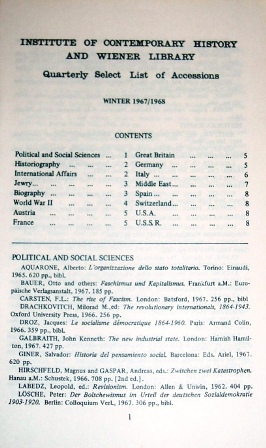Holocaust Education & Archive Research Team |
|
Survivor Stories
Holocaust Survivors Chelmno Survivors Righteous Gentiles Holocaust Recalled
| |||
Alfred Wiener (The Wiener Library)
Alfred Wiener was born in Potsdam, Germany on the 16 March 1885 and after attending grammar school in Bentschen, Poznan and then in Potsdam, he studied at the Universities of Berlin and Heidleberg, where he took his doctorate in Arab literature.
Following World War One, Wiener became the syndic and executive officer of the Centralverein, the largest Jewish organisation in Germany, which at its peak represented 300,000 people, over half the Jewish population in the country.
Its ideology was assimilation, emphasizing that Jews were national Germans entitled to full equality and differentiated only by religion. It offered legal protection to Jews, fought against the erosion of Jewish identity and the flood of anti-Semitic propaganda which was sweeping Germany in the 1920’s.
Wiener was particularly active in this struggle, regarding anti- Semitism as a test case of German democracy and constantly protesting against the indifference of the authorities, the silence of the press and public apathy.
Description by Alfred Wiener, of the leadership of the Centralverein of the position of Jews in Germany - June 1, 1933:
Between Heaven and Earth
But according to the ruling of the laws and regulations directed against us only the "Aryans" now belong to the German people. What are we, then? Before the Law we are non-Germans without equal rights; to ourselves we are Germans with full rights. We reject it, to be a folk or national minority, perhaps like the Germans in Poland or the Poles in Germany, because we cannot deceive our own innermost [feelings].
We wish to be subject as Germans with equal rights to the new Government and not to some other creation, whether it is called League of Nations or anything else. As far as we are concerned that also closes the question of Geneva,** which at present occupies Jewish people everywhere.
Wiener’s brochure “Vor Pogromen?” published in 1919 warned of the consequences of the pseudo-scientific hate-mongering which was perverting German nationalism under the eyes of the authorities, and he attacked the leniency of the judiciary in the early days of Nazi subversion. Wiener’s appeals to the conservative middle classes fell on deaf ears and he was obliged to leave Germany in 1933, fleeing to Holland where he established the Jewish Central Information Office.
This was the nucleus of the massive documentation on the perils of Nazism which he accumulated in late 1930’s and transferred to London in 1939. The Jewish Central Information Office played an important role in the British government’s propaganda warfare against Nazi Germany and as a source material for the British military, officialdom and the press about the Third Reich.
After the war, the Wiener Library, as it became known in 1947 provided crucial information in the prosecution of war criminals and subsequently developed into a major archive for the historical study of Nazism and the Third Reich.
Wiener frequently visited Germany in the 1950’s and sought to create a spirit of reconciliation between Jews and Germans while warning against any re-emergence of Nazism.
Alfred Wiener died on the 4 February 1964 in London.
The Wiener Library
The Wiener Library has been located in Devonshire Street in West London since 1939 but the lease ended in July 2009 and there are plans to relocate the library and its archives to 29 Russell Square , London WC1B 5BH. The Wiener Library collects material related to the Holocaust, its causes and its legacies. Contained on its on-line archive is over 65,000 items for both the casual reader and serious researcher to peruse. The material covers books, documents, personal possessions, photographs and periodicals.
The archive is multi- language, predominantly in English and German - importantly up to one third of its collection contain pre-war material, including statements and documents on the rise of Nazism and the start of persecution and terror against the Jews. Many Jews sought refuge in London, and the Wiener Library captured their individual accounts, including subjects such as Kristallnacht and incarceration in the new Concentration Camps springing up throughout Nazi Germany.
The Wiener Library has provided material for various War Crimes Trials, and indeed has a fine collection of the Nuremburg War Crimes Trials, and others. But it is not purely a collection of books, and documents, it serves as a living memorial to those who suffered and perished at the hands of the Nazis, and their Axis collaborators, and indeed as an Educational beacon, for the youth of today and tomorrow, about the evils of intolerance and racism.
A few quotes from a recent edition of the Wiener Library News, show how much the Wiener Library, the world’s oldest Holocaust memorial institution, is regarded:
“The Wiener Library has a unique place in the research of racism, anti-Semitism, fascism and the Nazi regime.”
-Professor Sir Ian Kershaw
“The Wiener Library is a secret jewel. It must be congratulated on its 70th year of life and supported.”
-Miriam Margoyles OBE
“The Wiener Library is vital if future generations are to have the opportunity to confront the past.”
-Andrew Motion CBE
“We must remember the Holocaust because it must never happen again. The Wiener Library exists to remind us.”
-Matt Lucas
* The Wiener Library Website can be found here: http://www.wienerlibrary.co.uk
Sources:
Alfred Wiener and the making of the Holocaust Library. Ben Barkow London: Vallentine Mitchell 1997 Who’s Who in Nazi Germany by Robert S Wistrich, published by Routledge, London 1995 C.V.-Zeitung, No. 22, June 1, 1933. The Wiener Library Website The Wiener Library News – summer 2009 issue number 58 Holocaust Historical Society
Copyright 2009 Chris Webb H.E.A.R.T
|


